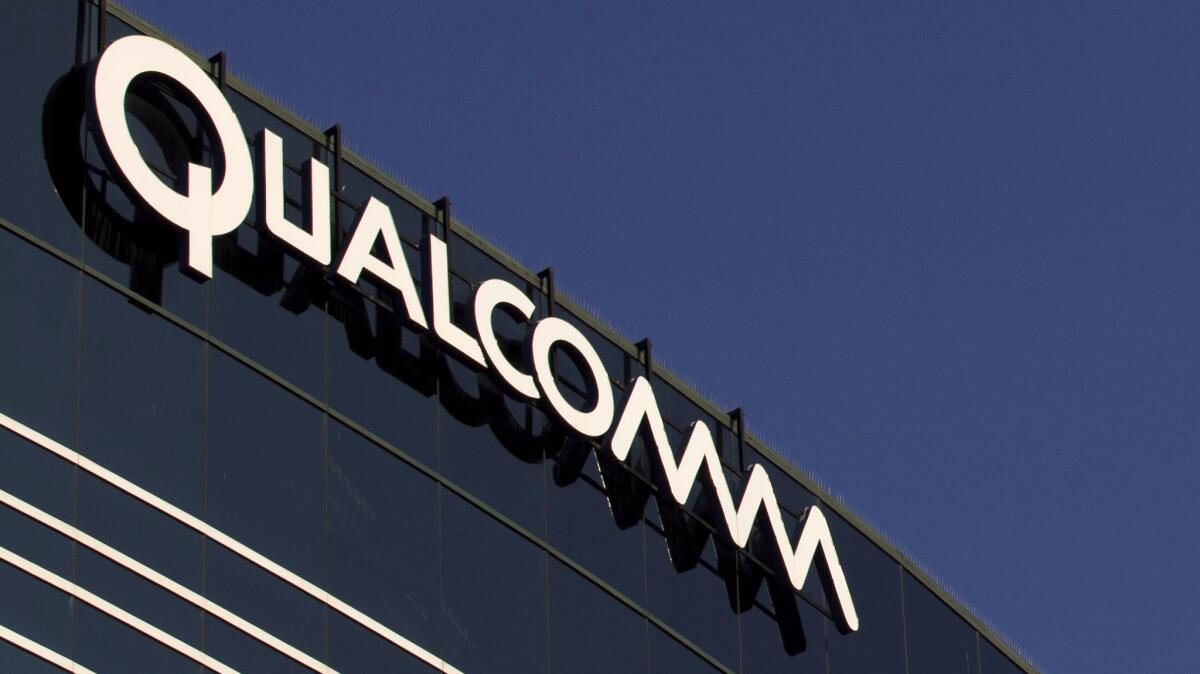Qualcomm reportedly in talks to buy NXP Semiconductors for $30 billion

Qualcomm is reportedly in talks to buy NXP Semiconductor for about $30 billion in what could be a transformative deal for the San Diego wireless company.
Citing unnamed sources familiar with talks, the Wall Street Journal reported Thursday that the two companies are in discussions. A Qualcomm spokeswoman said the company doesn’t comment on speculation. NXP, based in the Netherlands, could not be reached for comment.
If it happened, the deal would be by far the largest for Qualcomm, potentially transforming the company from a mobile chip maker and intellectual property provider to a broad-based semiconductor firm with a slew of products in automotive electronics, Internet of Things, secure payments and other markets.
It also could be a tricky integration, merging the cultures of a high-profile Southern California smartphone chip company with a European firm that supplies technology often not in the public eye.
“This would vault Qualcomm into so many markets, and from a product portfolio standpoint, I think the two companies would be just an awesome match,” said Jim McGregor, head of Tirias Research, a technology consulting firm. “But I would be concerned about the culture. These are two drastically different cultures.”
Such a deal could return Qualcomm to revenue and earnings growth. After three years of fast growth from its lead in 4G LTE technology, Qualcomm has struggled to boost its financial results in the last year or so amid slowing smartphone sales and increased competition in mobile chips.
Last year, Qualcomm’s revenue fell about 4% from 2014 to $25.3 billion. The company is expecting flat results this year.
Although Qualcomm has been pushing mobile technology into wearables, drones, mobile health, automotive connectivity and other markets besides handsets, these moves have not been enough to make up for slowing smartphone growth.
“Cellphones have peaked,” said Will Strauss, head of industry research firm Forward Concepts. “It’s just like Intel has found out [with] the personal computer market. It is not growing anymore because we all have one and last year’s model works as good as this year’s model, and the same thing is happening with smartphones.”
NXP is among the world’s top 10 semiconductor companies, with an estimated $10 billion in revenue, including from its recently acquired Freescale Semiconductor. It supplies many chips used in cars, including motor controls for such things as power windows and entertainment systems. It is the world’s largest supplier of automotive electronics.
NXP also makes near-field communication chips for mobile payments, secure payment semiconductors used in smart chip bank cards and point of sale products, as well as network communications infrastructure chips and radio frequency semiconductors for mobile devices. It also sells sensor chips and industrial mirco-controllers.
“NXP is probably one of the best positioned semiconductor companies on the planet right now because of their size, their product breath and the fact that they are in key areas that are growing” said McGregor of Tirias Research.
Last year, NXP kicked off what turned out to be a wave of consolidation in the semiconductor industry when it paid nearly $12 billion deal to buy Freescale, which is based in Austin, Texas. Intel followed with a $16.7-billion acquisition of Altera, and Avago jumped in with a $37-billion deal for Broadcom.
Qualcomm stayed on the sidelines, with Chief Executive Steve Mollenkopf concentrating on trimming costs, including cutting an estimated 4,000 jobs globally.
But Qualcomm did hire former Deutsche Bank analyst Brian Modoff last year as an executive vice president of strategy and acquisitions -- signaling that it would consider purchases as a way to return to growth.
Because NXP is based in Europe, Qualcomm could use its $29-billion war chest of offshore cash to finance the purchase, Bernstein Research analyst Stacy Rasgon said. Like other global companies, Qualcomm keeps a stockpile of cash offshore to avoid the higher U.S. taxes.
In addition to pushing Qualcomm into other markets, it also would be a big enough acquisition to boost Qualcomm’s bottom line. Rasgon estimates it would boost Qualcomm’s earnings 20% to 30%.
“Given Qualcomm’s size there are actually few acquisitions candidates that are big enough to move the needle and that also make sense, at least superficially, from a strategic point of view,” Rasgon said. “NXP appears to be one of these.”
Shares of both companies jumped on the news of a potential deal. Qualcomm’s stock gained 6% to $67.47, while NXP’s shares surged nearly 17% to $96.12.
Freeman writes for the San Diego Union-Tribune.
ALSO
A parade of lawmakers rip into Wells Fargo CEO John Stumpf
First it was exploding Samsung phones. Now it’s exploding Samsung washing machines
Supreme Court to decide if offensive names such as ‘Redskins’ and ‘Slants’ can be trademarked
UPDATES:
4:00 p.m.: This article was updated with additional reporting.
This article was originally published at 1:45 p.m.



